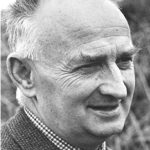Waldo Williams was a reluctant politician. It was only under duress that he agreed to stand as Plaid Cymru’s first ever candidate in Pembrokeshire in the 1959 general election.
 Waldo had to be discharged from bankruptcy before he could be adopted as a candidate as the law did not allow a bankrupt person to be elected as a member of parliament. He became bankrupt by choice, as he did not wish the authorities to take money from his bank accounts in lieu of his refusal to pay income tax contributions.
Waldo had to be discharged from bankruptcy before he could be adopted as a candidate as the law did not allow a bankrupt person to be elected as a member of parliament. He became bankrupt by choice, as he did not wish the authorities to take money from his bank accounts in lieu of his refusal to pay income tax contributions.
Waldo threw himself into the electoral campaign with gusto from the start with the aid of an unconventional agent, the opera singer, Eirwyn Charles. The campaign began and finished in St David’s, the home of the patron saint of Wales and, therefore, the cradle of the nation’s Christianity. Such symbolic gestures were important to Waldo.
Throughout the campaign Waldo refused to criticise his fellow candidates and the occasional meeting when few if anyone would be present was to him a mater of amusement and an opportunity to compose an englyn. He dealt with hecklers and awkward questions in the hustings with aplomb. A farmer once asked him if he knew how many ribs has a pig. Waldo replied that he did not know but if the farmer cared to bring a pig on stage he would gladly count the ribs.
Although he lost his deposit Waldo won many admirers as he attracted 2,253 votes. He refused to stand again as he preferred to spend his time in Ireland learning Gaelic rather than toiling between elections in order to raise the profile of Plaid Cymru in Pembrokeshire. Nevertheless, he would regularly attend Plaid Cymru Summer Conferences where he was usually the centre of attention on account of his wit.
It must be remembered that Waldo did not register as a conscientious objector during the Second World War on the basis of nationalism, as many other Welshmen did, but on the basis of his pacifism. Although he was a fervent patriot and in favour of Wales obtaining the right to decide her own future as a nation one day, Waldo never wrote a single poem in praise of the old princes as they were, in his view, leaders who preferred violence as a means to an end rather than the ways of peace.
